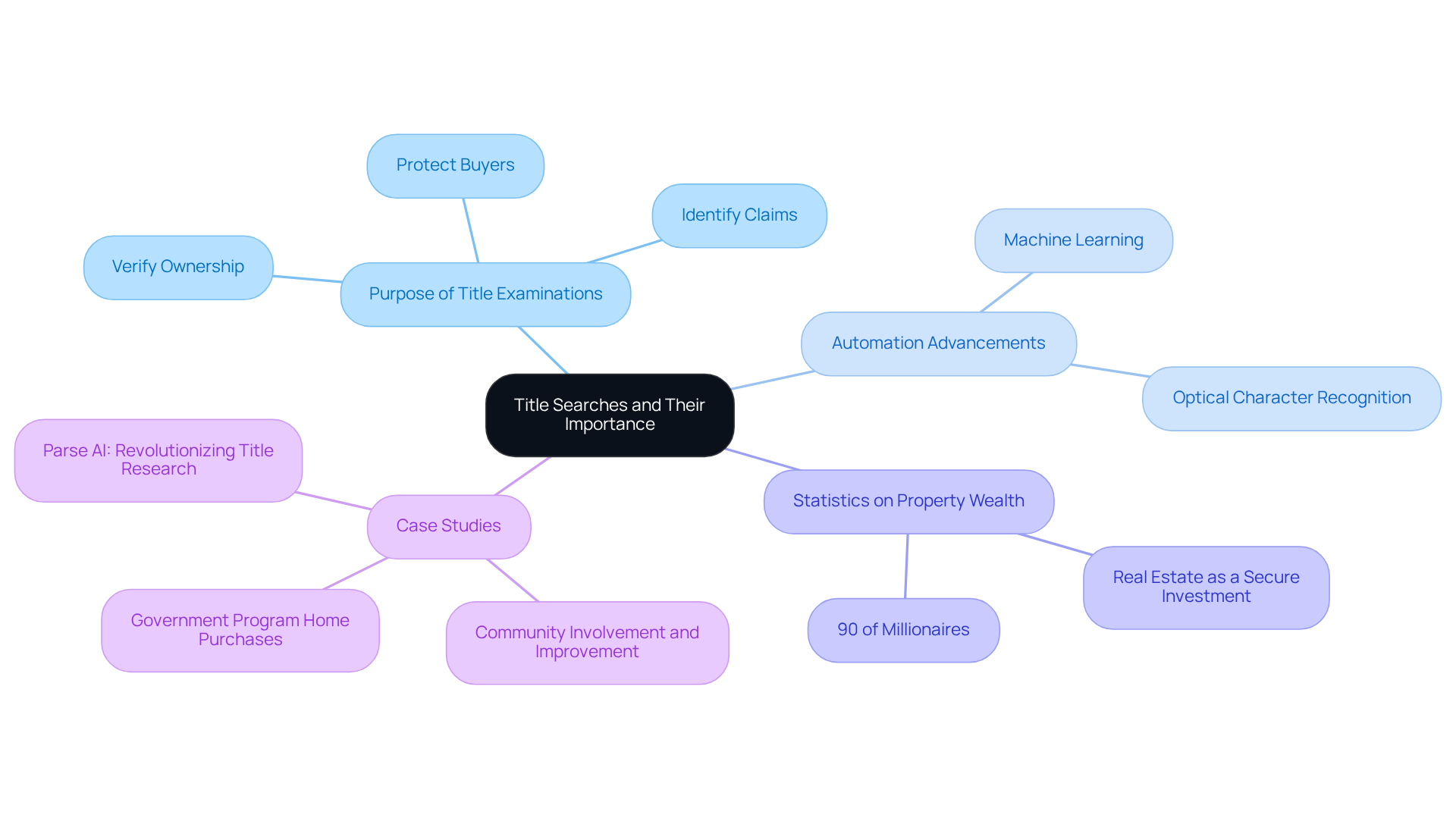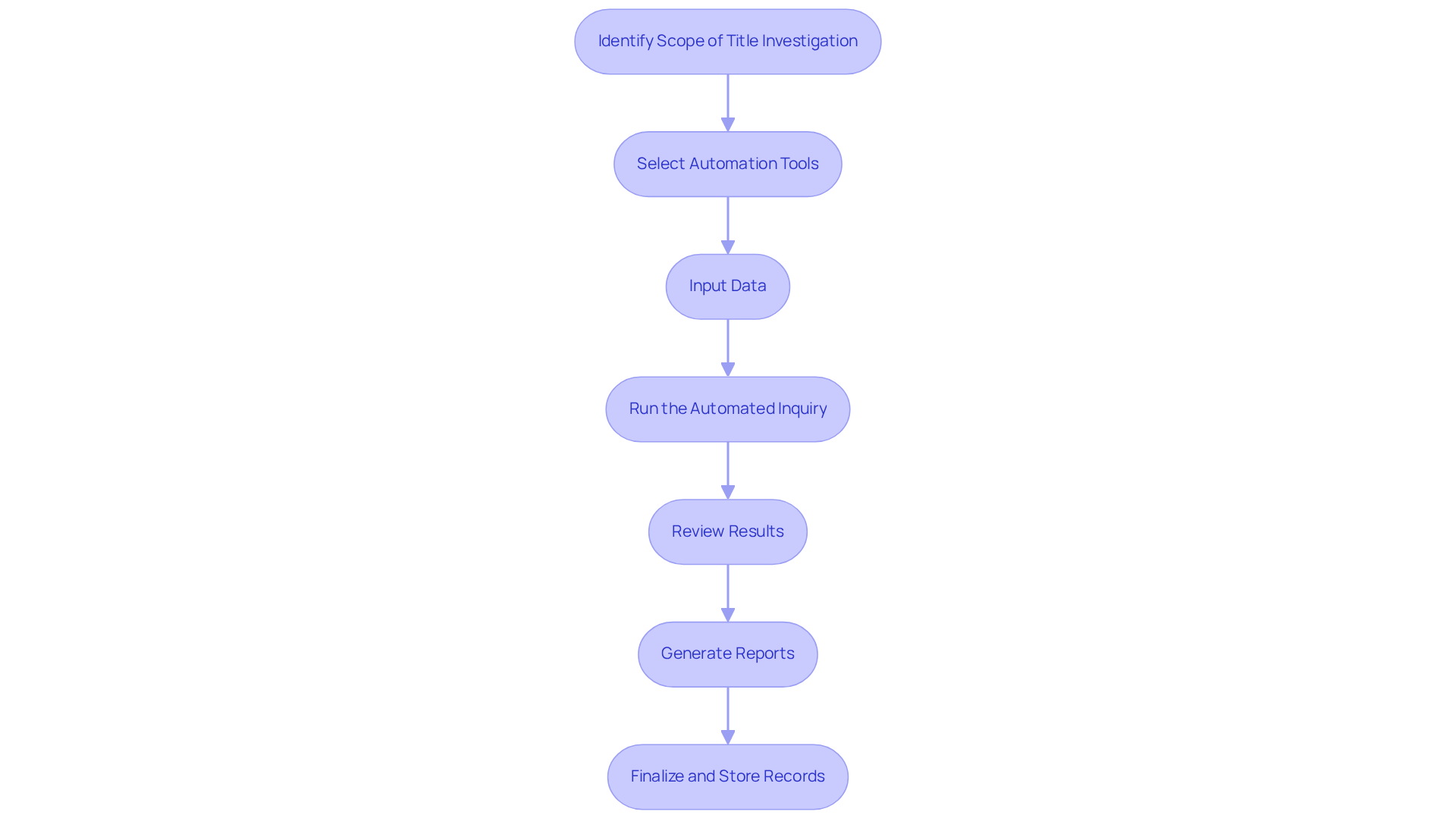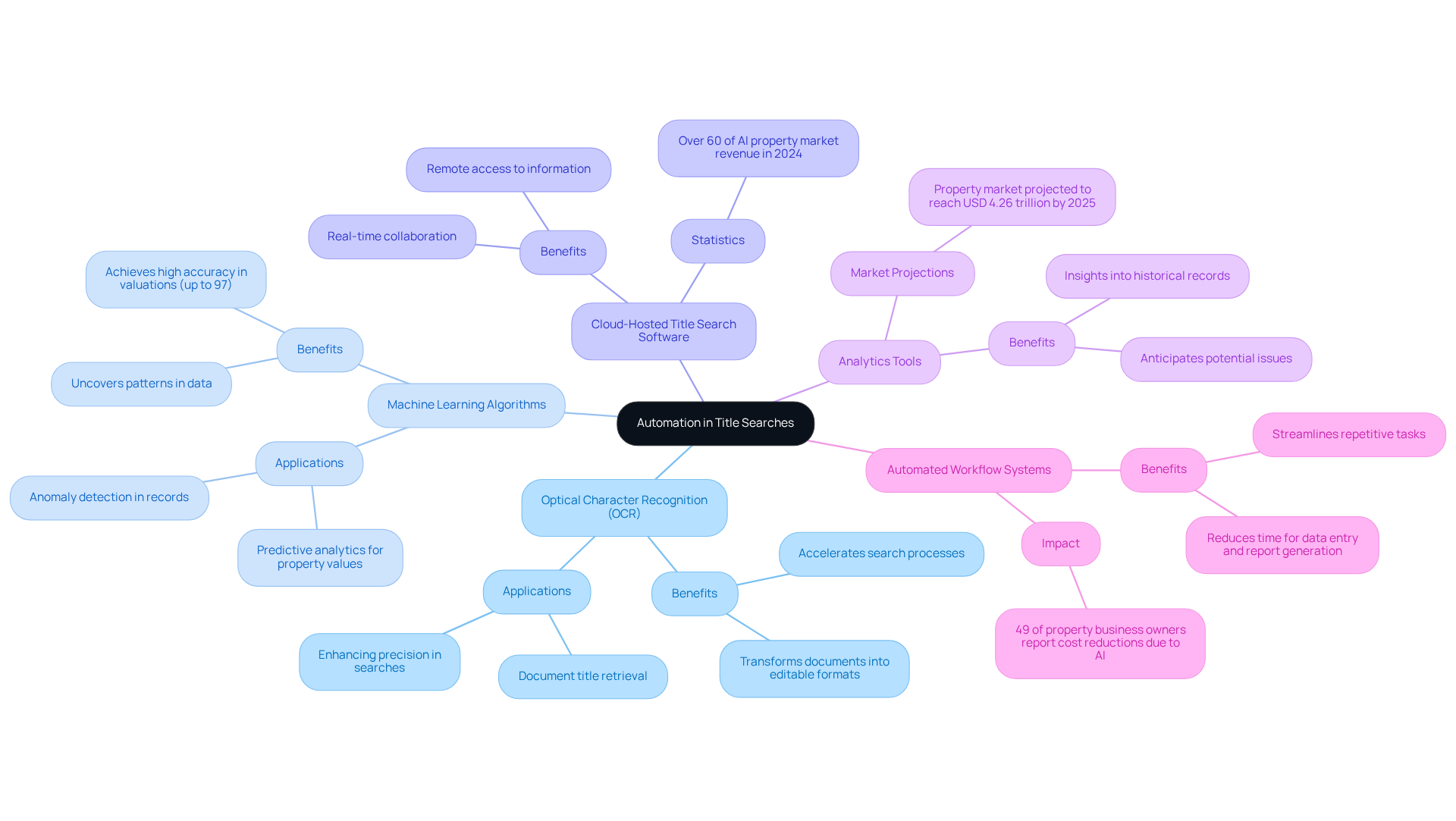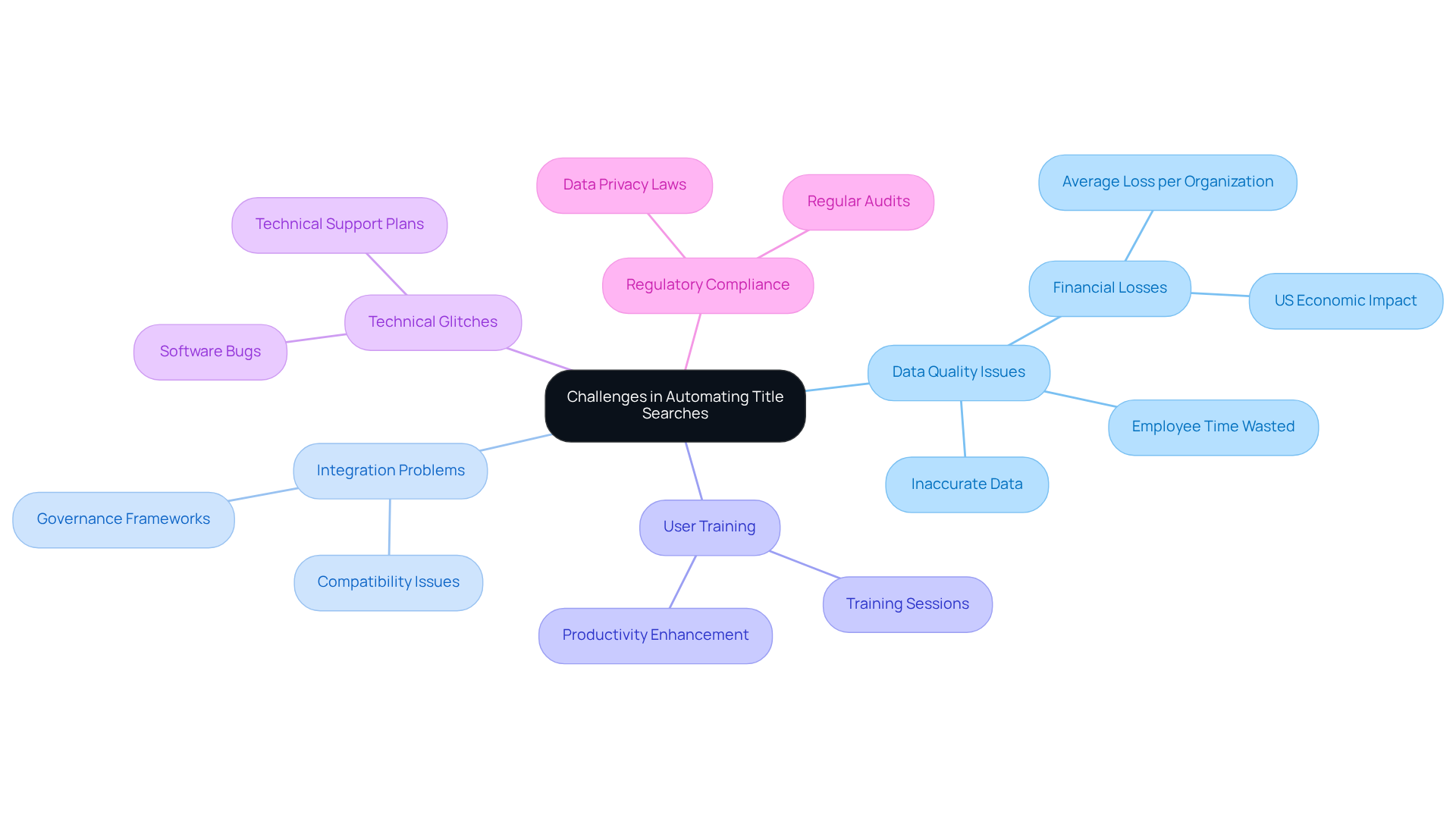Overview
The article presents a comprehensive step-by-step guide on automating title searches, highlighting the critical role of advanced technologies such as Optical Character Recognition (OCR) and machine learning. These innovations are essential for enhancing efficiency and accuracy in property investigations. By outlining a structured process that encompasses:
- Selecting suitable automation tools
- Inputting data
- Generating reports
the article substantiates its claim that automation can significantly reduce processing times and error rates in title searches. Consequently, this advancement ultimately bolsters transaction security within the real estate sector.
Introduction
Title searches are a critical component of real estate transactions, ensuring that buyers are protected from potential ownership disputes and legal complications. As the industry embraces technology, the automation of title searches presents an opportunity for real estate professionals to enhance efficiency and accuracy in their workflows. However, the transition to automated systems is not without its challenges.
How can stakeholders effectively navigate these complexities while reaping the benefits of streamlined title examinations? This guide delves into the step-by-step process of automating title searches, highlighting essential tools, technologies, and best practices to empower property experts in this evolving landscape.
Understand Title Searches and Their Importance
Title examinations are a cornerstone of real estate transactions, serving to verify the legal ownership of a property while uncovering any claims, liens, or encumbrances that could impact the sale. A thorough examination confirms that the seller has the authority to sell the property, thereby protecting the buyer from potential future conflicts. Recent advancements in ownership verification procedures have demonstrated how to automate title searches, streamlining these essential checks and enabling quicker and more precise results. For instance, employing machine learning and optical character recognition significantly enhances the effectiveness of document investigations, allowing researchers to swiftly obtain crucial information from extensive document collections.
Grasping the intricacies of property investigations, which involve reviewing public records and identifying potential issues, is essential for property experts. This foundational knowledge not only aids in effectively but also ensures a more focused approach to understanding how to automate title searches. Statistics indicate that approximately 90% of all millionaires accumulate their wealth through property, underscoring the significance of comprehensive ownership investigations in safeguarding investments. As Franklin D. Roosevelt aptly noted, property cannot be lost or stolen, rendering it a secure investment when managed properly. Case studies reveal that thorough document examinations can prevent costly legal disputes, highlighting the necessity of confirming legal ownership in property dealings. For example, Parse AI addresses the challenges associated with the time and resources required for verifying property ownership, revolutionizing ownership research and enhancing transaction security. As the real estate landscape evolves, learning how to automate title searches will continue to play a pivotal role in bolstering transaction security and efficiency.

Follow Step-by-Step Automation Process for Title Searches
- Identify the Scope of the Title Investigation: Begin by determining the specific property and the extent of the inquiry required. Gather crucial information, such as the property address, owner details, and any known liens, to guarantee a thorough investigation.
- Select Automation Tools: Choose software or platforms that specialize in title investigation automation, such as Qualia Marketplace. Look for features such as Optical Character Recognition (OCR) and machine learning capabilities, which can significantly streamline data extraction and enhance accuracy.
- Input Data: Enter the gathered property information into the selected automation tool. Precision is vital at this stage to avoid discrepancies in the results, as even minor errors can lead to significant problems later.
- Run the Automated Inquiry: Initiate the automated inquiry process. The software will efficiently scan public records and databases, retrieving relevant information about the property. This can reduce processing times by up to 50%, as evidenced by a 42% reduction in processing times at Sunshine Title Solutions after implementing an AI system.
- Review Results: After the inquiry is complete, carefully examine the results for accuracy. Automated systems may misinterpret information, so a manual check is essential to ensure reliability and completeness of the content. Notably, error rates fell by nearly 30% after AI implementation, highlighting the effectiveness of automation in reducing errors.
- Generate Reports: Utilize the automation tool to compile the findings into a comprehensive report. This report should clearly outline ownership history, any liens, and other pertinent information, providing a that can be generated in under ten minutes. According to DataTrace, the final product is a standardized data report provided in under ten minutes.
- Finalize and Store Records: Save the report and any relevant documents in a secure location for future reference. Ensure that all stakeholders have access to the necessary information, facilitating transparency and informed decision-making. The case study of Sunshine Title Solutions illustrates the positive impact of automation, achieving a 33% decrease in error rates and a 28% cut in operational costs.

Utilize Advanced Tools and Technologies for Automation
To effectively understand how to automate title searches, leveraging advanced tools and technologies is essential.
- Optical Character Recognition (OCR) serves as a pivotal technology, transforming various document types—including scanned paper documents and PDFs—into editable and searchable formats. By swiftly retrieving information from document titles, OCR significantly accelerates the search process, enhancing both precision and effectiveness.
- analyze extensive datasets to uncover patterns and anomalies in record data, enabling quicker detection of potential issues compared to traditional manual evaluations. Notably, machine learning applications in property have showcased predictive analytics achieving accuracy rates as high as 97% in valuations, underscoring the technology's reliability.
- Cloud-Hosted Title Search Software, such as TitleIQ and Qualia, provides cloud-based platforms that facilitate real-time collaboration and remote access to ownership information. This flexibility boosts workflow efficiency, empowering teams to operate seamlessly from various locations. Importantly, cloud-based solutions represented over 60% of the AI property market's revenue in 2024, highlighting their critical role in the sector.
- Analytics Tools offer valuable insights into historical record information, enabling professionals to anticipate potential issues based on past trends. With the property market projected to reach USD 4.26 trillion by 2025, the use of analytics is becoming increasingly vital for informed decision-making.
- Automated Workflow Systems streamline repetitive tasks, such as data entry and report generation, which can help in understanding how to automate title searches and drastically reduce the time required for these processes. Approximately 49% of property business owners report cost reductions attributed to AI, illustrating the impact of automation on operational efficiency. By automating these processes, property professionals can focus on more strategic activities, ultimately enhancing productivity and service delivery.
The integration of OCR and machine learning not only simplifies document inquiries but also enhances overall precision, establishing them as essential tools in the modern property market. Furthermore, a notable 85% of real estate professionals anticipate that AI will significantly influence the industry by 2030, emphasizing the transformative potential of these technologies.

Identify Challenges and Troubleshoot Automation Issues
While automating title searches significantly enhances efficiency, several challenges may arise:
- Data Quality Issues: Inaccurate or incomplete data can lead to erroneous search results, costing organizations substantially. It is essential to confirm that input information is precise and current; poor data quality can result in financial losses averaging $15 million annually for organizations and costs the US economy approximately $3.1 trillion each year. Implementing regular information quality checks is crucial to identify and rectify issues before they impact search outcomes.
- Integration Problems: Automation tools may not always integrate seamlessly with existing systems, leading to operational disruptions. Ensuring compatibility is vital, and consulting with IT professionals can facilitate smoother integration processes. Organizations must also be aware of challenges related to inconsistent information formats and prioritize establishing robust governance frameworks to effectively manage integration challenges.
- User Training: Staff may require training to utilize new automation tools effectively. Thorough training sessions are essential to guarantee that all team members are comfortable with the technology, which can enhance overall productivity and minimize the time spent on information issues—up to on correcting inaccurate information, hindering decision-making and increasing operational expenses.
- Technical Glitches: Software may experience bugs or downtime, hindering operations. Consequently, having a technical support plan in place is essential for promptly addressing these issues, ensuring minimal disruption to title search processes. For instance, information downtime challenges during mergers or infrastructure upgrades can lead to customer complaints and poor analytical outcomes.
- Regulatory Compliance: Automated processes must comply with local laws and regulations regarding data privacy and property transactions. Regular audits can help maintain compliance and prevent costly legal issues, as non-compliance can lead to significant reputational damage and financial penalties.
By proactively identifying these challenges and implementing effective solutions, real estate professionals can maximize the benefits of automation in title searches, specifically focusing on how to automate title searches, ultimately improving efficiency and accuracy in their workflows.

Conclusion
Automating title searches marks a pivotal advancement in the real estate sector, offering a streamlined method for verifying property ownership and identifying potential issues. By harnessing cutting-edge technologies such as Optical Character Recognition and machine learning, real estate professionals can significantly enhance the efficiency and accuracy of their title investigations. This ultimately safeguards transactions and protects investments.
The article delineates a comprehensive step-by-step process for automating title searches, underscoring the importance of selecting appropriate tools, ensuring data quality, and addressing common challenges. Key insights emphasize the necessity of:
- Thorough training for staff
- Seamless integration with existing systems
- Maintaining compliance with regulatory standards
Collectively, these elements contribute to a more effective title search process, minimizing errors and reducing operational costs.
As the real estate landscape continues to evolve, embracing automation in title searches is not merely advantageous but essential. By adopting these innovative practices, professionals can not only enhance their workflows but also position themselves to meet the future demands of the industry. The integration of advanced technologies in title searches will bolster transaction security and empower stakeholders to make informed decisions, ultimately shaping a more efficient and transparent real estate market.
Frequently Asked Questions
What is the purpose of a title search in real estate transactions?
A title search verifies the legal ownership of a property and uncovers any claims, liens, or encumbrances that could affect the sale, ensuring the seller has the authority to sell the property and protecting the buyer from future conflicts.
How has technology improved the title search process?
Recent advancements, such as machine learning and optical character recognition, have automated title searches, streamlining checks and enabling quicker, more precise results by allowing researchers to swiftly obtain crucial information from extensive document collections.
Why is understanding property investigations important for property experts?
Grasping the intricacies of property investigations, which involve reviewing public records and identifying potential issues, is essential for effectively implementing automation and ensuring a focused approach to understanding how to automate title searches.
What statistic highlights the importance of property ownership investigations?
Approximately 90% of all millionaires accumulate their wealth through property, underscoring the significance of comprehensive ownership investigations in safeguarding investments.
What did Franklin D. Roosevelt say about property investment?
Franklin D. Roosevelt noted that property cannot be lost or stolen, indicating that it can be a secure investment when managed properly.
How can thorough document examinations benefit real estate transactions?
Thorough document examinations can prevent costly legal disputes and highlight the necessity of confirming legal ownership in property dealings.
What role does Parse AI play in the title search process?
Parse AI addresses challenges related to the time and resources required for verifying property ownership, revolutionizing ownership research and enhancing transaction security.
Why will learning to automate title searches continue to be important?
As the real estate landscape evolves, automating title searches will play a pivotal role in bolstering transaction security and efficiency.




